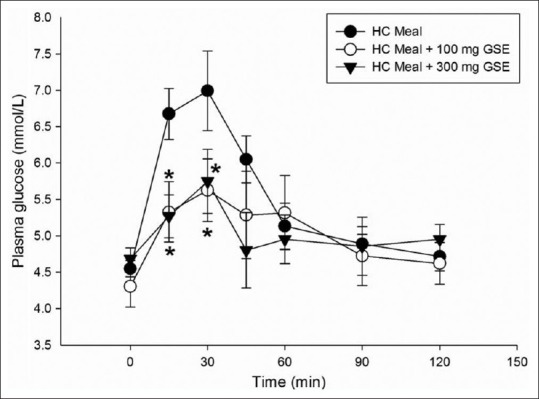Jjazz
#21
Grapeseed extract looks to have a lot of potential for longevity. In addition to the vascular benefits that are frequently touted, it also is a potent inhibitor of alpha glucosidase and alpha amylase, which means that it can slow the digestion of starches just like acarbose. In a clinical study, it gave a very nice reduction in AUC for blood glucose following a high carb meal:

3 Likes
Ulf
#22
“Reduced postprandial glycemia observed in the present study can be explained by the inhibitory activity of GSE (grape seed extract) proanthocyanidins against α-glucosidase and pancreatic α-amylas”.
The >100 grams of blueberries I include in my dessert carb meal contain more proanthocyanids than 200 mg of GSE and has a glucose AUC lowering effect, but of course the carbs in the blueberries contribute to the glucose spike on its own.
Am taking acarbose to counter this. Would be interesting to compare it with GSE however the potential anti-againg effects of acarbose may may be gut-mediated as well.
The other benefits of GSE, such as lowered blood pressure and perhaps decreased carotid intima-media thickness, are likely met by a substance like blueberries.
Davin8r
#23
It seems difficult to imagine that the inhibition of alpha-amylase by GSE would be anywhere near the potency of acarbose because I get horrendous gas from even small doses of acarbose but literally zero from grape seed extract (and I’ve never even heard of GSE causing GI symptoms). Unless perhaps GSE can slow the absorption but still allow for complete absorption of the carbohydrates, thus nothing left for fermentation by colonic bacteria (unlike acarbose)?
1 Like